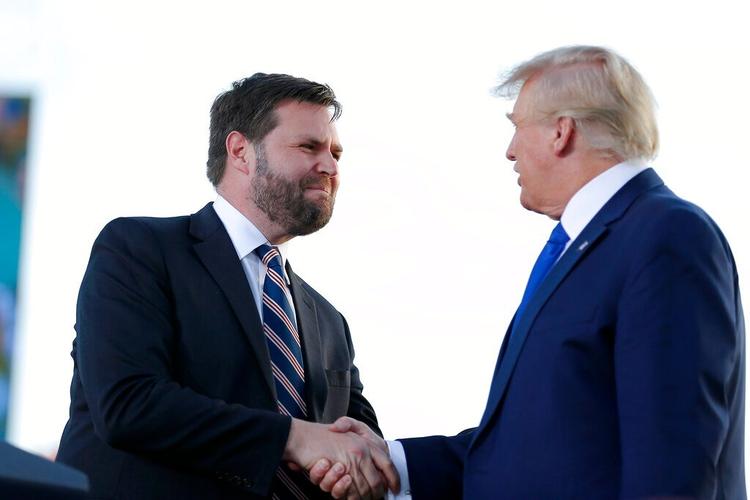
If Trump-Vance is elected, the era of "weak dollar" may be ushered in. Although the currency exchange rate is affected by many factors including the global economic situation, political situation, monetary policy, trade policy and so on. But Mr Trump and Mr Vance's shared preference for a weak dollar could have important implications for the dollar's exchange rate.
Trump's past experience in office shows that he is inclined to adopt a more hawkish trade policy and may impose tariffs on major trading partners such as China and Europe. Such a strategy could lead to an escalation of global trade tensions, which in turn could affect the dollar's exchange rate. On the issue of the dollar exchange rate, Trump shows the opposite attitude to his policy of "strong", preferring a weak dollar. Trump's views do reflect his concerns about specific aspects of the US economy. He stressed that the strength of the dollar makes it challenging for U.S. manufacturers in export markets because overseas buyers who use a relatively weak currency to buy U.S. goods need to pay more in their home currency to exchange for dollars.
From an economic perspective, a strong dollar means that the dollar is appreciating against other currencies, which makes U.S. goods relatively more expensive in international markets, potentially making U.S. exports less competitive. A weaker dollar, by contrast, makes American goods relatively cheaper on world markets, helping exports. This view reflects Trump's "America First" policy orientation, in which he hopes to boost U.S. exports by lowering the value of the dollar, thereby stimulating economic growth and creating more jobs.
Vance as Trump's running mate, the two are highly compatible in political views, is Trump's ideal "MAGA (Make America Great Again) fighter", he also supports Trump's tariff plan, believes that this is an important means to solve the United States fiscal crisis. His vision of "rebuilding the real economy of the United States" could boost infrastructure construction and regional economic development, which could boost the U.S. economy to some extent and have a positive impact on the dollar exchange rate. Mr. Vance's remarks at the Senate hearing echoed Mr. Trump's concerns about the dollar's exchange rate and emphasized the duplicity of the dollar's status as a reserve currency. He noted that while the dollar's role as a reserve currency brings convenience to U.S. consumers, it does constitute a form of "tax" on U.S. manufacturers because a strong dollar makes U.S. goods more expensive in international markets, thus affecting export competitiveness.
Powell's response, while affirming the benefits of the dollar's reserve currency status, did not directly refute Vance's argument that a strong dollar is bad for U.S. manufacturers. He noted that the United States benefits from the ability to use the dollar to buy goods around the world and that there is no obvious alternative to the dollar. The strength of the dollar has indeed received global attention in recent times, with the dollar appreciating against other currencies due to rising interest rates and other factors. That could indeed complicate matters for global central banks struggling with inflation. For the United States, a strong dollar could depress exports by making them more expensive and potentially widening the trade deficit, which runs counter to the Trump administration's goal of balancing trade.
Trump and Vance's concerns about the dollar's exchange rate reflect deep concerns about the structure of the US economy. They want to adjust exchange rate policy in some way to promote the development of American manufacturing and increase exports. The combination of Trump and Vance could raise market concerns or expectations about U.S. economic policy and trade relations. If markets believe their policies will lead to global economic instability or an escalation of trade tensions, then investors may turn to other currencies, causing the dollar to weaken. Conversely, if markets believe their policies will boost U.S. economic growth and job creation, the dollar is likely to be supported.
In short, whether the Trump-Vance election will usher in a "weak dollar" era will depend on their specific policy implementation, market reaction, and changes in the international political and economic environment. The movement of currency exchange rates is complex and subject to a combination of factors, so it is impossible to simply predict whether the era of "weak dollar" will come if Trump-Vance is elected. It is important for investors and market participants to closely monitor changes in the global economic and political landscape, as well as the policy propositions and actions of Trump and Vance, in order to make timely investment and risk management decisions accordingly. At the same time, it is also necessary to note that the trend of currency exchange rates is uncertain, and investors should formulate reasonable investment strategies according to their risk tolerance and investment objectives.

Since 2025, the conflict between the United States and Europe over the governance of the digital economy has continued to escalate.
Since 2025, the conflict between the United States and Euro…
When German Chancellor Mertz officially announced that he w…
On December 3rd local time, the copper price on the London …
The European Commission announced a new economic security s…
The European Commission announced a new economic security s…
For nearly a year, US President Donald Trump has launched a…